
Classic Nepal Itinerary
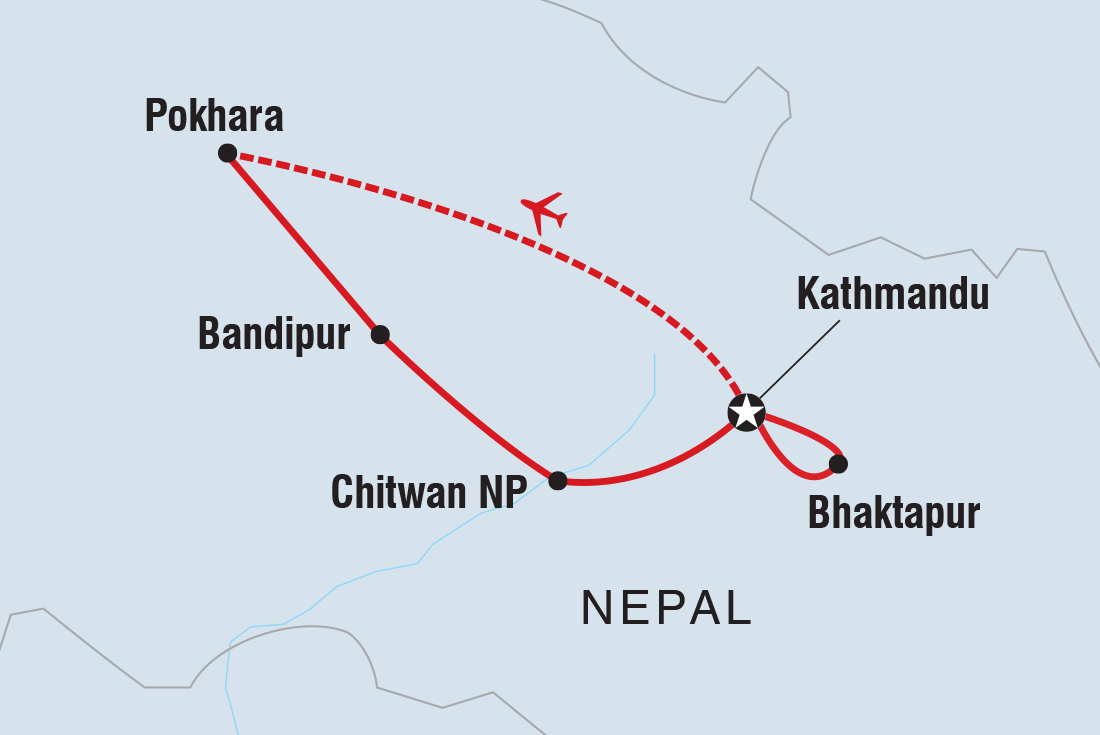


Namaste! Welcome to Nepal. Arrive in Kathmandu and take your complimentary airport transfer to the hotel. Your adventure begins with a welcome meeting at 6 pm where you'll meet your trip leader and fellow travellers. The evening is free to explore the streets of Kathmandu, whose mixture of ancient architecture and modern development, and rich artistic and cultural heritage means it remains the legendary destination it has been for decades. Crowded markets and bazaars are the centre of Nepali life, and the narrow streets are home to holy men, monks, bicycles, incense, goats, and sacred cows. You may like to join your leader and group for an optional dinner at one of Kathmandu's fine Nepali restaurants.
Weather permitting, you'll have the option to take a Mount Everest scenic flight this morning. This experience will take you over Sagamartha National Park through a crescendo of the highest peaks in the world, getting up close to Mount Everest. After breakfast, you'll explore Kathmandu, visiting Pashupatinath, the most famous Hindu temple in the country, located on the banks of the holy Bagmati River. Here you'll see Hindu holy men (sadhus) meditating, pilgrims bathing and occasionally funeral pyres burning on the ghats. You'll also visit Bodhnath Stupa, one of the most significant Buddhist shrines in the world, where you can observe Buddhist monks in prayer in the monasteries surrounding the stupa. After lunch, it's time to explore Swayambhunath Temple (the Monkey Temple). A UNESCO World Heritage Site, this is one of the city's most famous temples and fascinatingly reflects Buddhist and Hindu beliefs. From here, you'll head to Durbar Square, which sits at the front of the old royal palace. You'll get a chance to admire the beautiful temples and browse the stalls of merchant's wares. The evening is yours to explore the city as you wish.
Today, you’ll fly to Pokhara – if you’re lucky you might catch a glimpse of the spectacular Himalayan Mountain chain to the north. When you arrive, take a scenic boat ride across the lake of Phewa Tal – the second largest lake in Nepal. You can stretch your legs and check out Taal Barahi temple in the middle of the lake or simply admire the views from the boat. Enjoy a free evening, perhaps asking your leader for their favourite lakeside restaurant to visit for dinner.
If you're an early riser, you'll have the option to wake up early and enjoy the sunrise over Sarangkot Hill this morning. Then, after breakfast, you'll visit the Peace Pagoda, where spectacular views of the mountains await. Take in vistas that span the Annapurnas to the famous fishtail peak, Machhapuchhare, and back to Pokhara. From here, you'll visit the fascinating International Mountain Museum to learn the amazing tales of past climbing expeditions – some ending in triumph, some ending in tragedy. After a morning of exploring, you'll head to a local Tibetan Refugee Camp for lunch. You'll hear stories of their journey from Tibet to Nepal, learn about local life and take part in a traditional cooking demonstration to find out how to make delicious momo (steamed dumplings). Of course, you'll sit down for a group lunch and tuck into the fruits of your labour.
Today you'll travel to Bandipur by private vehicle. This traditional Nepalese town is a natural treasure and one of the country's hidden gems. Bandipur was once an essential stop for traders travelling to Tibet, and the town's single main street is still lined with buildings that once housed a wide variety of merchants. Many of the buildings have been converted now, but their architecture remains. Enjoy a peaceful stay in this charming, rural location.
Enjoy a day of free time to explore Bandipur further. The surrounding hills are ideal for hiking along trails that will take you through tribal villages and hilltop shrines that once doubled as fortresses. Bandipur is saddled on a high ridge above Dumre, making for an exceptional view of the Himalayan panorama. You may prefer to visit the town's temples or relax with a coffee and a spectacular view.
After breakfast, you'll drive to Chitwan National Park. After arriving and settling in, you'll be introduced to the camp staff and resident naturalists, who'll discuss the activities for the upcoming days. In the early evening, the local Tharu dance troupe may perform a cultural program. You'll enjoy dinner as a group and then the evening will be all yours – maybe relax in the bar and discuss the day's animal sightings or listen to the stirrings of the jungle at night.
Embark on an early-morning jeep safari in search of the great Indian rhino, deer and exotic birdlife or joining one of the other activities available to explore the park (the safari will either happen on day 7 or Day 8, depending on the hotel staff's schedule). After breakfast, you’ll leave the lodge and go on a dugout canoe adventure on the Rapti River. This is an exciting trip with chances to catch a glimpse of marsh mugger crocodiles and various birds that inhabit the riverbanks. A program will be organised for the rest of the day and may include further excursions by jeep or a visit to one of the nearby villages.
If you’re an avid wildlife lover, an optional early-morning birdwatching safari is available today – a worthwhile addition to your trip. After breakfast, drive along the Trisuli River to Bhaktapur and enjoy a stop along the riverbank for lunch. Bhaktapur was once the capital of Nepal and the Great Malla Kingdom during the 15th century. Its rich heritage, inspiring temples and artisanal history played a big part in Bhaktapur being named a UNESCO World Heritage Site. Enjoy an evening of exploration on your own, soak up the lovely atmosphere in one of the local cafes, or simply relax in your hotel.
Spend the morning exploring Bhaktapur's famous temples, starting at Durbar Square, which is said to be the most beautiful piece of art in Nepal. Durbar Square is home to the majestic Lion Gate and Golden Gate. You 'll also visit the Yakcheswor Mahadev Temple- a replica of Pashupatinath Temple in Bhaktapur. In the afternoon, drive to Kathmandu. The evening is yours to spend as you wish – your group may like to head out for an optional final dinner as your Nepal adventure comes to an end.
Your trip officially comes to an end after breakfast today. If you would like to stay longer, just speak to your booking agent.

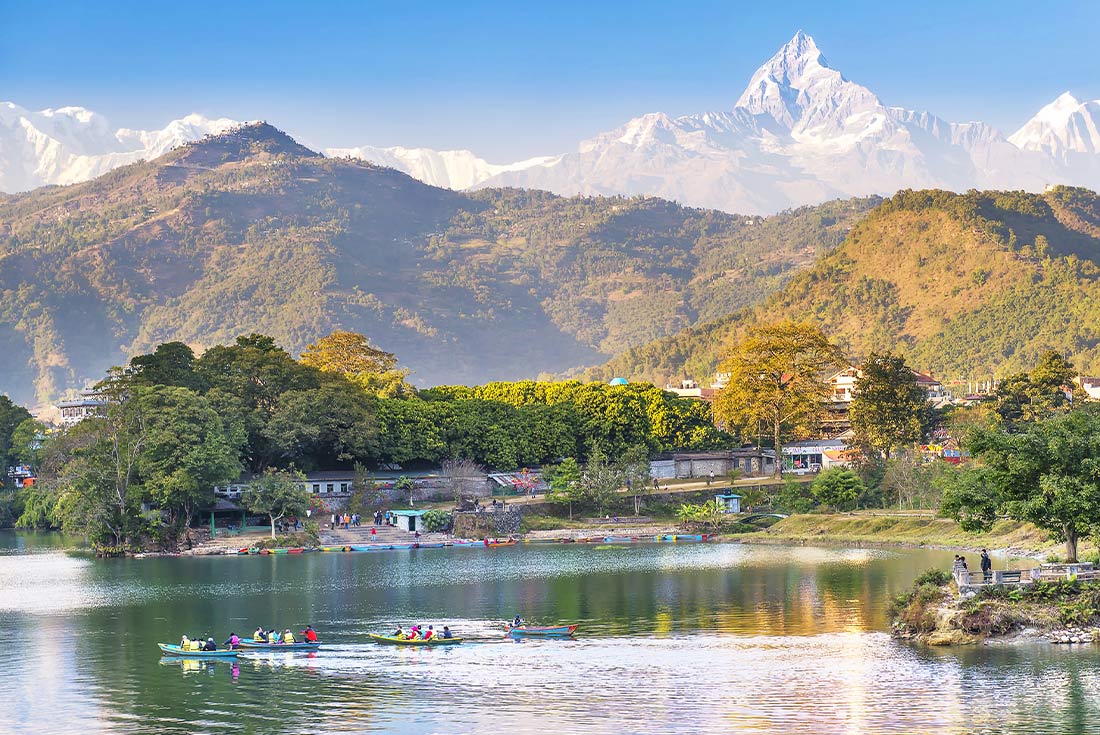
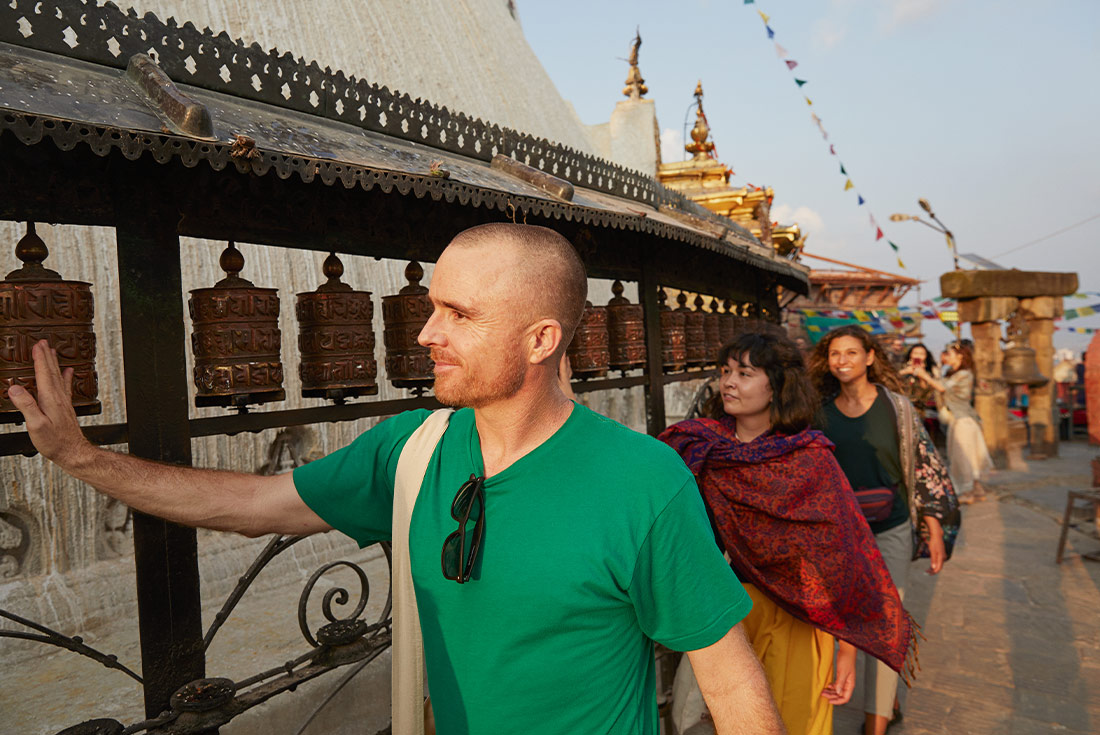
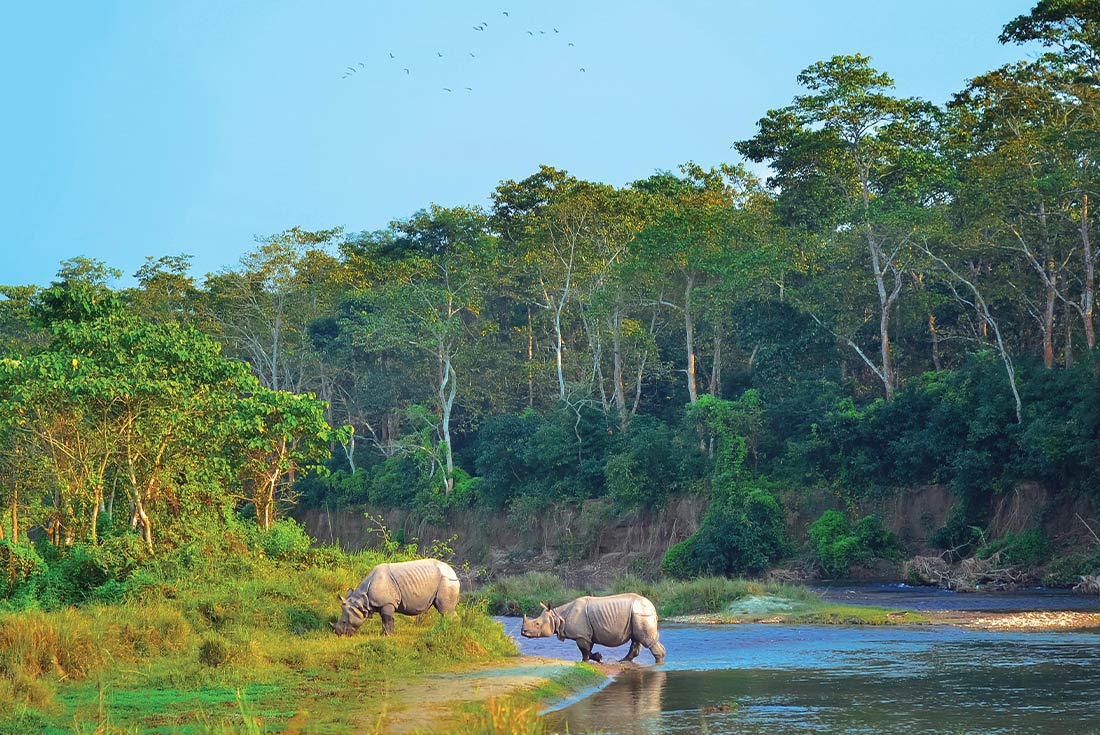
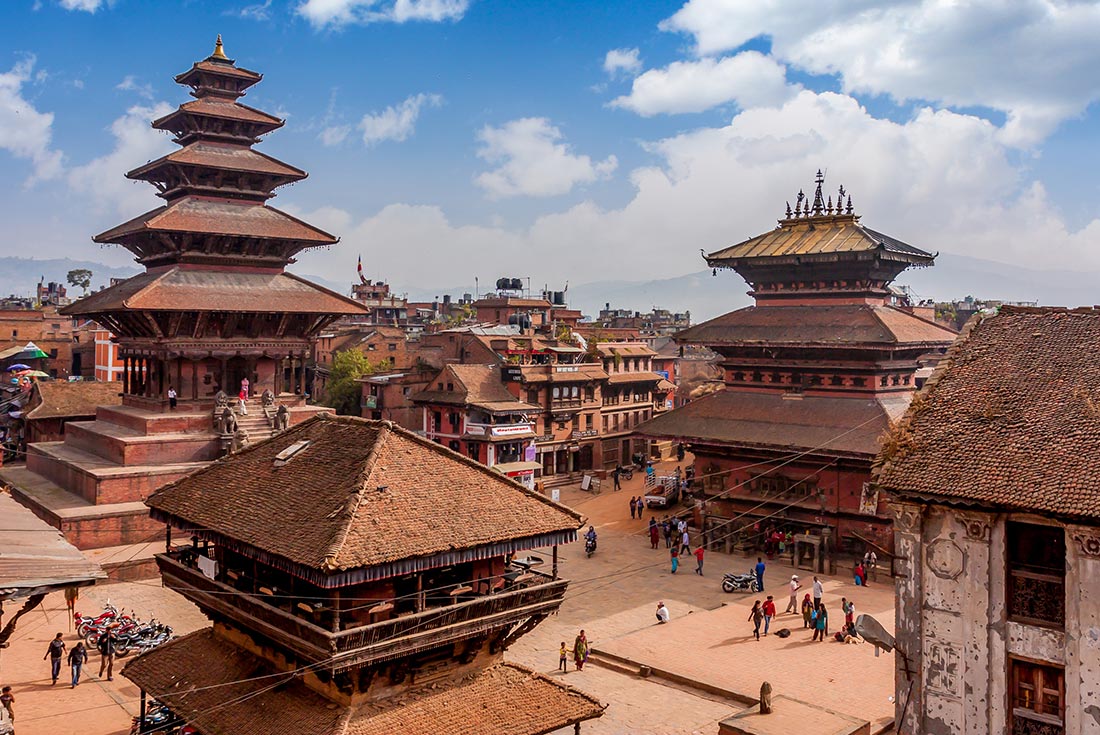
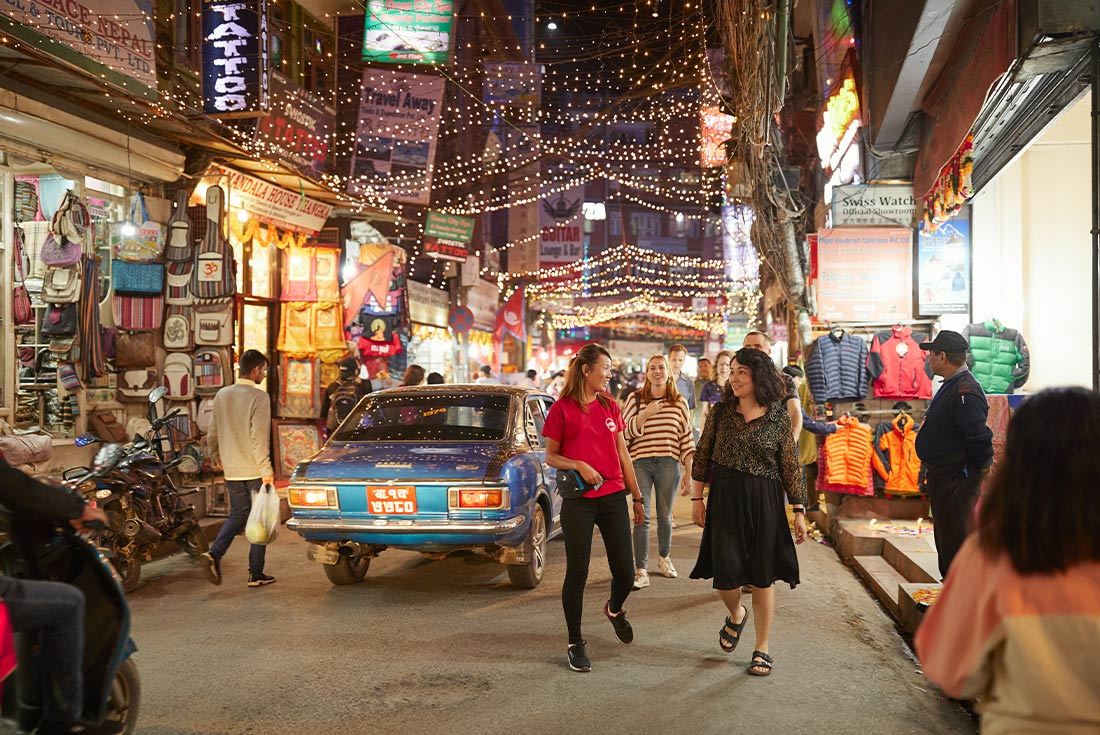
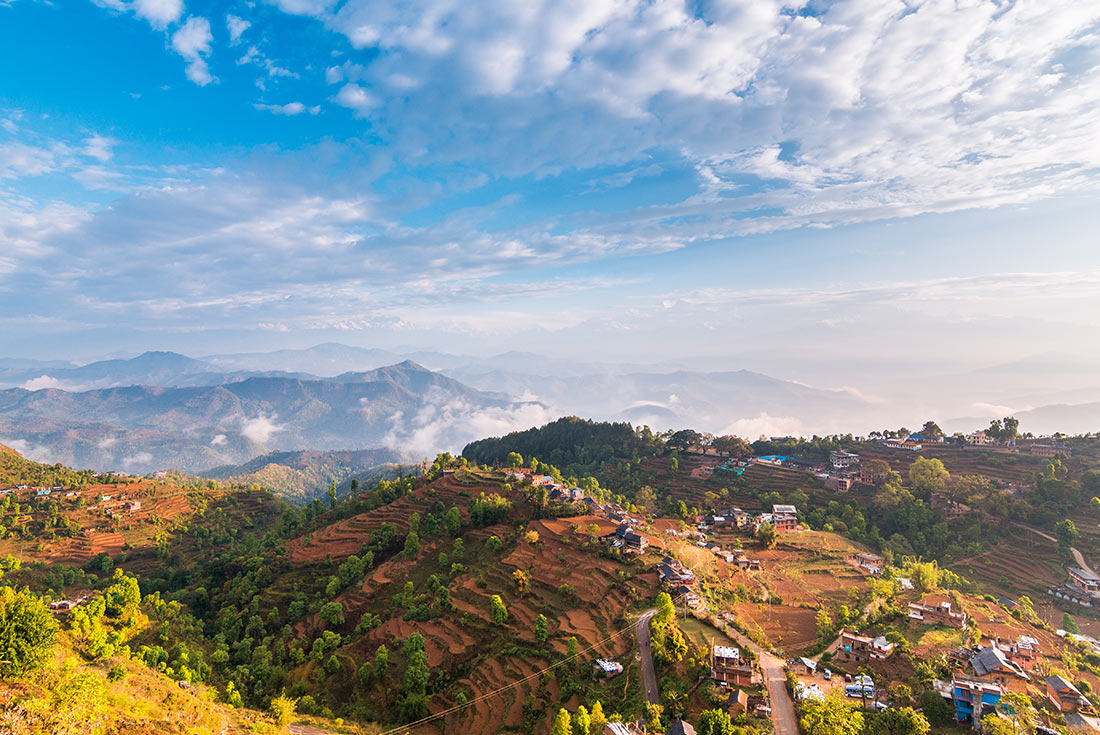
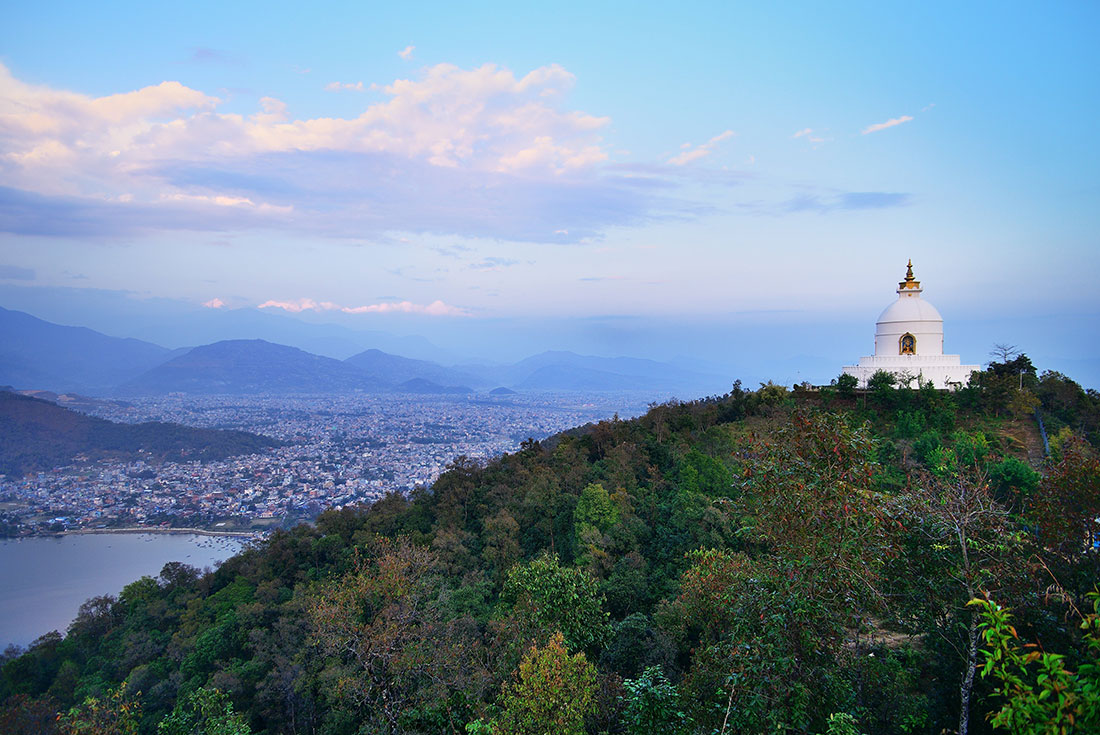
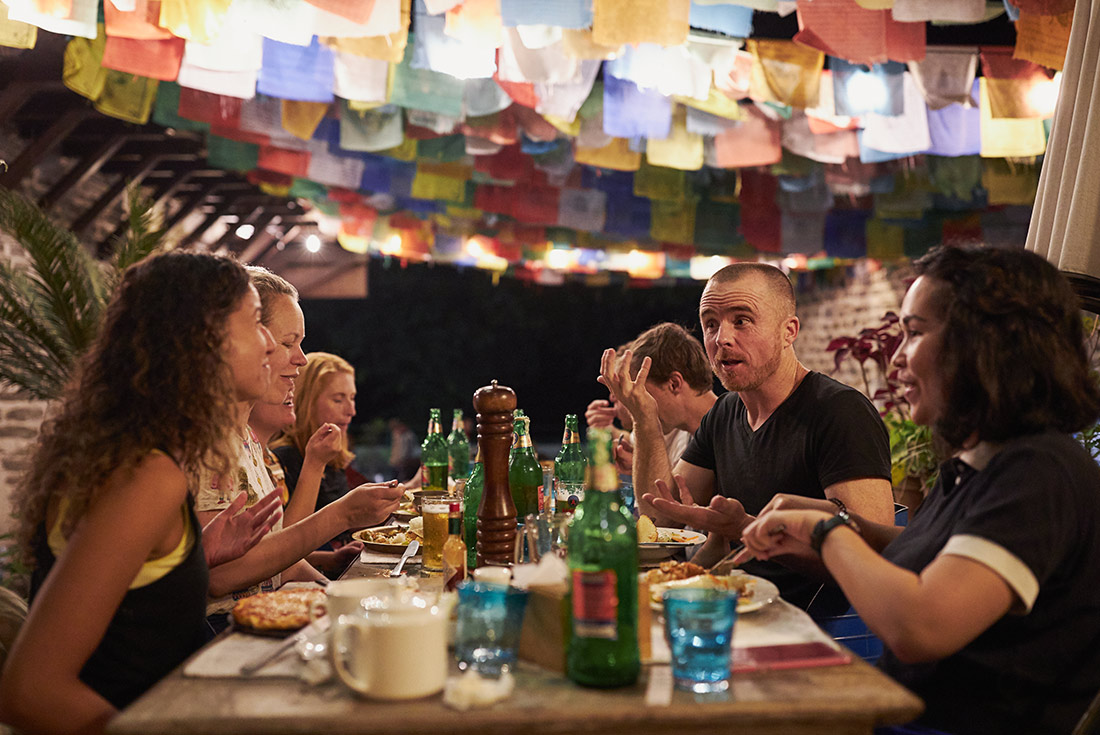
Kathmandu - Pashupatinath Temple
Kathmandu - Boudhanath Stupa and Monastery visit
Kathmandu - Durbar Square
Kathmandu - Swayambhunath Temple
Pokhara - Phewa Tal Lake boat trip
Pokhara - Tibetan community visit with momo lunch
Pokhara - Sunrise from Sarangkot Hill
Pokhara - Peace Pagoda
Pokhara - International Mountain Museum
Bandipur Day Trip
Village Tour, Sunset view & Tipical Tharu Stick Dance(Cultural Show Around 30 Minute)
Canoe Ride & Jeep Safari at The Chitwan National Park
Chitwan NP - Bird watching tour
Bhaktapur - Leader-led walking tour
Beginning and ending in Kathmandu, there's more than enough time to discover the Nepali capital's staggeringly rich cultural and artistic heritage.
Take a jeep safari with a local guide in Chitwan National Park – a beauty brimming with exotic wildlife – and you may be lucky enough to spot rhinos or elusive leopards and tigers.
Visit a Tibetan refugee camp and get to know the community before taking on a cooking demonstration to learn how to create traditional momos (steamed dumplings).
Discover world-class mountain scenery and explore the hill-perched Buddhist Peace Pagoda of laid-back Pokhara.
This is the perfect trip for those who want a cultural insight into Nepal without strenuous trekking, with plenty of inclusions, free time and comfortable accommodation in each destination.
Hotel Ambassador, Lazimpat , Kathmandu, NEPAL, Phone: +977 14442726
Hotel Ambassador, Lazimpat , Kathmandu, NEPAL, Phone: +977 14442726
1. A complimentary airport arrival transfer is included; valid if you are arriving on Day 1 or if you have booked pre-tour accommodation through us. You must provide your flight details to your booking agent at least 14 days prior to travel.
2. The single supplement excludes Days 5 and 6 where you will be in shared accommodation and is subject to availability.
3. This trip includes domestic flights. The luggage allowance is 20kg for check in luggage and 5kg for carry on. You can store excess luggage at the start point hotel.
4. Please provide your full name exactly as per passport at the time of booking (including any middle names listed on your passport) for flight tickets. Fees may apply for adding or amending details within 45 days of departure, and in some cases you will be required to cover the cost of issuing new tickets.
While we always endeavour to provide the best possible holiday experience, due to the nature of travel and the areas we visit sometimes things can and do go wrong. Should any issue occur while you are on your trip, it is imperative that you discuss this with your group leader or local representative straight away so that they can do their best to rectify the problem and save any potential negative impact on the rest of your trip.
We recognise that there may be times when your group leader or local representative may not be able to resolve a situation to your satisfaction - if this is the case, please ask the group leader or local representative to speak to their direct manager.
You may also choose to provide details in your online feedback, which we ask you to complete within 30 days of the end of your trip. Please do be aware that it is very difficult for us to provide any practical help after the trip is completed, so informing us while still travelling will give us the opportunity to resolve the issue in real-time., For general contact details please use the following page: https://www.intrepidtravel.com/contact-us, In case of a genuine crisis or emergency, you can reach our local office on the numbers below:
, Available for phone call or WhatsApp call on +977 980 112 3617
This trip does not go to high altitudes, so if this was keeping you back from visiting Nepal in the past, this trip is for you., While on a map you aren't travelling particularly far, the reality of road travel in Nepal is that things always take longer than you expect. Some roads will be bumpy, dusty or even unexpectedly blocked requiring reroutes and plenty of patience., Hotels in some destinations may vary in standard and facilities, and hot water may occasionally be limited. There will be times when the location of our accommodation will mean it is practical to eat at the hotel restaurant rather than heading out for optional meals., While there will be opportunities to spot many different kinds of wildlife, sightings cannot be guaranteed., You will see tour operators offering elephant riding activities and many tourists taking part in them during your time in Chitwan. Intrepid Travel has a strong elephant welfare policy and as such we discourage travellers from riding elephants in Nepal or anywhere around the world. Please refer to the 'Responsible Travel' section of the Essential Trip Information for more details.
Beginning and ending in Kathmandu, there's more than enough time to discover the Nepali capital's staggeringly rich cultural and artistic heritage., Take a jeep safari with a local guide in Chitwan National Park – a beauty brimming with exotic wildlife – and you may be lucky enough to spot rhinos or elusive leopards and tigers., Visit a Tibetan refugee camp and get to know the community before taking on a cooking demonstration to learn how to create traditional momos (steamed dumplings)., Discover world-class mountain scenery and explore the hill-perched Buddhist Peace Pagoda of laid-back Pokhara., This is the perfect trip for those who want a cultural insight into Nepal without strenuous trekking, with plenty of inclusions, free time and comfortable accommodation in each destination.
All group trips are accompanied by one of our group leader or local representative. The aim of the group leader or local representative is to take the hassle out of your travels and to help you have the best trip possible. Intrepid endeavours to provide the services of an experienced group leader or local representative however, due to the seasonality of travel, rare situations may arise where your group leader or local representative is new to a particular region or training other group leader or local representative.
Your group leader or local representative will provide information on the places you are travelling through, offer suggestions for things to do and see, recommend great local eating venues and introduce you to our local friends. While not being guides in the traditional sense, you can expect them to have a broad general knowledge of the places visited on the trip, including historical, cultural, religious, and social aspects. At Intrepid we aim to support local guides who have specialised knowledge of the regions we visit. If you are interested in delving deeper into the local culture at a specific site or location then your group leader or local representative can recommend a local guide service in most of the main destinations of your trip.
TRAVEL ADVISORIES & ALERTS
We recommend that you check your government's foreign travel advisory for the latest information about the destination before you travel. You will also need to ensure that your travel insurance covers you for all destinations and activities on your trip. We also recommend saving the phone number for emergency consular assistance for your government’s consulate in the destination/s you’ll be travelling. Links to travel advisories and any current travel alerts for our trips can be found here: https://www.intrepidtravel.com/travel-alerts
PERSONAL SAFETY
Ensure you have a secure method of carrying your passport, phone, credit cards and cash while travelling such as a money belt. Leave all other high value items, including jewellery, at home Use safety deposit boxes at hotels to store your valuables when available and ensure your luggage is lockable. Be aware of the risk of pick-pocketing and petty theft. Exercise caution when walking at night, don’t walk alone and stick to well-lit streets wherever possible. Be vigilant on public transport and look out for your fellow travellers. Take precautions such as carrying your bag in front of you and never leaving personal items unattended.
LGBTQIA+ TRAVELLERS
Intrepid welcomes all LGBTQIA+ customers on our trips, however we operate in parts of the world that are less accepting. We support LGBTQIA+ customers to travel to these destinations and are committed to ensuring they face no discrimination on any part of the trip we control. We recommend you visit Equaldex (https://www.equaldex.com/) and your government's foreign travel advice for LGBTQIA+ travellers when choosing your trip., https://www.intrepidtravel.com/safety-guidelines
PASSPORT
You’ll need a valid passport to travel internationally and most countries require your passport to have a minimum of 6 months validity, so remember to check the expiry date.
We need your passport information to get everything ready for your trip so it’s important that the information on your booking matches your passport exactly. Please take care to provide the correct details. We recommend carrying a copy of the photo page of your passport while travelling and leaving a copy at home with family or friends.
VISAS & ENTRY REQUIREMENTS
Many countries require a visa and obtaining the correct visa for your trip and any countries you may transit through is your responsibility. We recommend you check your visa requirements as soon as you have booked your trip. This will ensure you have time to prepare your documents and for your visa application to be processed. You can check the entry requirements for your nationality on your government's foreign travel advisories, consular websites or on our page here: www.intrepidtravel.com/visa-entry-requirements
Information not available.
Validity: 01 Jan 2026 to 31 Dec 2026
GENERAL HEALTH
All travellers need to be in good physical health in order to participate fully on this trip. For the safety and wellbeing of yourself and others, if you are unwell prior to travelling, please stay at home and contact us to make alternative arrangements.
When selecting your trip please make sure you have read through the itinerary carefully and assess your ability to manage and enjoy our style of travel. Please note that if in the assessment of our group leader or local representative a traveller is unable to complete the itinerary without undue risk to themselves and/or the rest of the group, we reserve the right to exclude them from all or part of a trip without refund.
You should consult your doctor for up-to-date medical travel information or for any necessary vaccinations before departure. We recommend that you carry a first aid kit as well as any personal medical requirements in their original packaging as they may not easily be obtained while travelling. If you are carrying medication, ensure you check your government's foreign travel advice for any local restrictions or requirements.
, AIR POLLUTION
Air quality in Nepal can be poor, especially in winter. Some towns, including Kathmandu, experience very high levels of seasonal smog and heavy particulate pollution. Seek medical advice if you're concerned about the effects of air pollution.
ALTITUDE SICKNESS
This trip doesn’t visit any locations above 2,500m in Nepal. If you would like to read more on altitude sickness you can find more information here: https://www.intrepidtravel.com/altitude-sickness
MOSQUITO-BORNE ILLNESSES:
Malaria is a risk in some areas of Nepal including Chitwan National Park. Dengue fever and Japanese encephalitis also occur, including on occasion in Kathmandu. Protect yourself against insect bites by wearing adequate protection, including repellent.
MEDICAL FACILITIES AND TREATMENT:
Medical facilities in Nepal are very limited, particularly outside Kathmandu. In Kathmandu, treatment at international-standard clinics is expensive and up-front payment for services is generally required. Make sure you have adequate travel health insurance and accessible funds to cover the cost of any medical treatment, including evacuation by helicopter.
While travelling with us you'll experience the vast array of wonderful food available in the world. Your group leader or local representative will be able to suggest restaurants to try during your trip. To give you the maximum flexibility in deciding where, what and with whom to eat, generally not all meals are included in the trip price. This also gives you more budgeting flexibility. As a rule, our groups tend to eat together to enable you to taste a larger variety of dishes and enjoy each other's company. If you have dietary requirements and/or food allergies, please let your booking agent know prior to departure., FOOD IN NEPAL:
In Kathmandu and Pokhara there are plenty of restaurants and cafes for all tastes and budgets. For a glimpse at what traditional Nepali cuisine entails, check out our guide here: https://www.intrepidtravel.com/adventures/guide-to-nepali-cuisine/
Nepal caters very well towards vegetarians and vegans with almost all restaurants having a veg section of the menu. Your group leader or local representative will be able to direct you towards restaurants that are known to have better hygiene, especially in tourist areas where they are travelling with our groups regularly.
SPENDING MONEY
When it comes to spending money on the trip, every traveller is a little different. You know your spending habits better than we do, so please budget an appropriate amount for things like optional meals, drinks, shopping, optional activities, and laundry. Make sure you have read the itinerary and inclusions thoroughly so you know what is included in the trip price and what you may need to pay for while travelling. , NEPAL
The official currency of Nepal is the Nepali rupee (NPR). Its symbol is often displayed as Rs. ATMs can only be found in Kathmandu, Pokhara, and Bhaktapur. Make sure you carry sufficient cash to cover your needs when travelling outside these cities. Money exchange facilities are available in Kathmandu, Namche, Pokhara, Chitwan (only outside the park), and Bhaktapur. Credit cards are not widely accepted.
The Government of Nepal has banned the import, export, and use of 500 and 1000 Indian rupee notes in Nepal. You should ensure you are not carrying these notes on arrival in Nepal as they will be confiscated and you may be fined.
Before departing on a trek or travelling to remote areas, make sure you have enough Nepalese currency to purchase meals and drinks, in the smaller denominations where possible, as there are no ATMs and larger notes (such as NPR 1000) can be difficult to change.
USD cash is the easiest to exchange. We recommend bringing large bills in good condition, 2013 series onwards only. Any old or damaged notes may not be accepted.
NPR is a blocked currency, which means it can only be obtained in Nepal and cannot be exchanged outside Nepal. Ensure you use or exchange all NPR before leaving the country.
, TIPPING
Tipping can be an appropriate way to recognise great service when travelling. While it may not be customary in your home country, it is an entrenched feature of the tourism industry across many of our destinations and is greatly appreciated by the people who take care of you during your travels. It is always best to avoid tipping with coins, very small denomination notes, or dirty and ripped notes, as this can be regarded as an insult rather than the goodwill gesture it is intended to be., OPTIONAL TIPPING KITTY
On Day 1 of your trip, your group leader or local representative may discuss with you the idea of operating a group tipping kitty, whereby everybody contributes an equal amount and your group leader or local representative distributes tips for drivers, local guides, hotel staff and other services included on your trip. Participation in this kitty is your choice, and you are welcome to manage your own tipping separately if you prefer.
The group leader or local representative will keep a running record of all monies spent, which can be checked at any time. Any funds remaining at the end of the trip will be returned to group members. These tips to suppliers are for great service and are in addition to the regular costs paid for the services supplied.
The tipping kitty excludes tips for your group leader or local representative., Optional tipping kitty for this trip: NPR 4000 per person., YOUR GROUP LEADER OR LOCAL REPRESENTATIVE
Tipping your group leader or local representative is highly appreciated if you feel they’ve provided outstanding services throughout your trip. The amount is entirely a personal preference; however, as a guideline, the recommended amount is 4-7 USD or EUR per traveller per day (in a currency relevant to your destination). Of course, you are free to tip more or less as you see fit, depending on your perception of service quality and the length and involvement of your group leader or local representative on your trip., CONTINGENCY FUNDS
We try to plan for every eventuality, but there are still some things beyond our control. We reserve the right to change an itinerary after departure due to local circumstances or a Force Majeure Event. In such emergency circumstances, the additional cost of any necessary itinerary alterations will be covered by you. Please note we are not responsible for any incidental expenses that may be incurred as a result of the change of itineraries including but not limited to visas, vaccinations or non-refundable flights. Make sure you have access to an extra US$500 for emergencies (e.g. severe weather, natural disasters, civil unrest) or other events that result in unavoidable changes to the itinerary (e.g. transport strikes or cancellations, airport closures). Sometimes these things necessitate last-minute changes to enable our trips to continue to run, and as a result, there may be some extra costs involved. The recommended amount is listed in USD for the relatability of universal travellers, however, local currency may be needed once in the country to cover these costs.
Most travellers prefer to take a small to medium wheeled suitcase, which is a great size for the packing capacity in our private vehicles. Whatever you take, be mindful that you will need to be able to carry your own luggage, handle it at airports, take it in/out of accommodation and perhaps even walk short distances. We recommend you pack as lightly as possible.
If your trip includes travelling on overnight trains or primarily using public transport, the smaller your luggage, the easier it will be to store under or above bunks. Large suitcases may not be able to be taken on board. A lockable bag or small padlock for your bag will be useful, especially when travelling on public transportation as well.
When you're exploring during the day, you'll also need a day pack/bag to carry water, a camera, a jacket and activity-specific items like a swimsuit, a waterproof pouch/bag for your phone, or hiking shoes.
Below we have listed the essentials for this trip:, https://www.intrepidtravel.com/packing-list, WATER BOTTLE
Please bring your own water bottle to refill. Although it can be difficult to avoid bottled water when travelling, please use the water dispensers which are provided on some of our vehicles and at some of our accommodation. When unable to avoid bottled water, it is better to buy the largest available and distribute it into your smaller bottle for the day. Some travellers like to bring a bottle with its own filtration system or water purification tablets. If you are walking or trekking as part of your trip, you will need to carry at least 2 litres of water with you.
SEASONAL INFORMATION:
Nepal's climate varies greatly depending on the season:
JUN - SEP: the monsoon rains (mostly at night) bring landslides in regional areas. Cloud cover often obscures mountain views with rain, mud, and leeches deterring most trekkers at this time of year. Treks running in September can be hot and very humid at lower altitudes. See what it's like to trek during monsoon here: https://www.intrepidtravel.com/adventures/nepal-during-monsoon-season/
MAR-APR: Spring brings warm weather and spectacular rhododendron blooms. A popular time to visit and one of the peak times to trek.
OCT - NOV: Clear skies and warm days make autumn the peak season.
DEC - FEB: Winter brings cold temperatures and snow to the mountains. Good trekking,but remember to rug up. Make sure to bring appropriate winter clothing.
Some towns, including Kathmandu, experience very high levels of seasonal smog which can lead to decreased scenic visibility.
Intrepid won't tolerate any kind of violence, harassment (whether physical, verbal or sexual), or disrespect toward fellow travellers, our teams or local communities.
To ensure the wellbeing of everyone on the trip, decisions made by your group leader are final.
Romantic relationships between travellers and group leader or local representative are not permitted while on trip.
Any behaviour that prevents your leader from continuing the itinerary as planned, breaks local laws or opposes any of these guidelines may result in Intrepid denying your booking or removing you from the trip.
If something concerns you during your travels, please speak to your group leader immediately. Alternatively, you can contact us on the emergency contact number detailed in the Problems and Emergency Contact Information section of this Essential Trip Information.
The style of accommodation indicated in the day-to-day itinerary is a guideline only and may change. On some occasions, alternative arrangements may need to be made due to the lack of availability of rooms in our preferred accommodation. In these cases, we will use a similar standard of accommodation.
Throughout the trip, we request that our properties prepare rooms in time for our arrival, especially if we're arriving prior to normal check-in time. However, this isn't always possible which means we won't be able to check-in immediately on arrival at some hotels. Instead, we can store our luggage and explore our new destination or on some trips, have use of shared day rooms until all rooms are available.
MONSOON:
The monsoon season is from June to September and weather conditions can disrupt travel during this time due to flooding and landslides. Disruption of air travel and airport closures are also possible. Be prepared for your itinerary needing to change at short notice.
ROAD TRAVEL:
Roadworks and infrastructure projects can cause significant delays on major roads within cities and highways between destinations. Road travel can also be disrupted due to demonstrations and bandhs (strikes) without warning. Major roadworks are currently ongoing in and around Kathmandu and the roads to Chitwan National Park. Delays, heavy traffic, poor road conditions, and dust are a reality of road travel in Nepal.
AIR TRAVEL:
Nepal's only international airport, Tribhuvan International Airport, has a single runway that services both domestic and international flights. Cancellations and delays are frequent, especially during peak tourist seasons or in poor weather. Travellers have on occasion missed international connections as a result of this. Ensure you have adequate travel insurance and contact numbers for your airlines before departure.
Travel insurance is compulsory on all our trips for those travelling internationally. We require that, at a minimum, you are covered for medical expenses, including emergency repatriation. If you are travelling within your home country or region, please confirm before travel that you are entitled to access the public medical system easily should an accident occur. We strongly recommend all travellers have a policy that also covers personal liability, cancellation, curtailment and loss of luggage or personal effects. For international trips, you will not be permitted to join the group until evidence of travel insurance and the insurance company's 24-hour emergency contact number has been sighted by your group leader or local representative.
If you have credit card insurance, your group leader or local representative will require details of the participating insurer/underwriter, the level of coverage, policy number, and emergency contact number, rather than the bank's name and your credit card details. Please contact your bank for these details prior to arriving in-country.
For travellers who reside within the European Union, Switzerland or the USA, the requirement to purchase travel insurance cannot be compulsory. However, the purchase of travel insurance is still highly recommended, and each country you visit may have its own specific entry requirements. For example, some mandate travel health insurance for all foreign travellers, regardless of their nationality. Travellers from the European Union, Switzerland or the USA who decline travel insurance when travelling outside their home region must sign a Travel Insurance Waiver Form at the Group Meeting, recognizing personal responsibility for emergency medical and repatriation costs should they arise.
For assistance with travel insurance or other services, please visit the link below:
, https://www.intrepidtravel.com/booking-resources/our-services
As you travel on a group trip you will be exposed to all the pleasures and maybe some of the frustrations of travelling in a group. Your fellow travellers will probably come from all corners of the world and likely a range of age groups too. We ask you to be understanding of the various needs and preferences of your group - patience with your fellow travellers is sometimes required for the benefit of everyone's travel experience. Remember too that you have responsibilities to the group. If you are requested to be at a place at a certain time, ensure that you don't keep the rest of the group waiting. We have found time and time again that the very best trips we operate are those where the dynamics within the group work well - this takes just a little effort on your part. Due to privacy reasons, we are unable to provide you with contact details and any personal information about your fellow travellers booked on your trip prior to departure., SOLO TRAVELLERS
On our trips, rooming is organised on a twin-share basis. We pair up solo travellers with another traveller of the same gender, as per the gender marker on each of their passports.
We also offer an optional single supplement on most trips for travellers who prefer to have their own room. This only applies to accommodation during the tour. Pre-trip and post-trip accommodation booked through us will always be on a single-room basis.
On a small selection of trips some accommodation will be open-gender and multishare, such as a felucca in Egypt or an overnight train in Vietnam. Please review the Accommodation section of the Essential Trip Information for details about your trip.
LGBTQIA+ TRAVELLERS
We strive to create a safe and inclusive environment for everyone. If your gender identity differs from what is indicated on your passport, please contact us so that we can discuss rooming options with you.
ITINERARY CHANGES
Our itineraries are updated regularly throughout the year based on customer feedback and to reflect the current situation in each destination. The information included in this Essential Trip Information may therefore differ from when you first booked your trip. It's important that you review this information prior to travel so that you have the latest updates. Due to weather, local conditions, transport schedules, public holidays, political unrest or other factors, further changes may be necessary to your itinerary once in-country. Your group leader or local representative will keep you up to date with any such changes once your trip is underway and has the authority to amend or cancel any part of the trip itinerary if deemed necessary due to safety concerns.
, OPTIONAL ACTIVITIES
A selection of optional activities that have been popular with past travellers are listed in the day-to-day itinerary. This isn't an exhaustive list and should be used as a guide only for some of what might be available. Prices are approximate, are for entrance fees only, and don’t include transport to and from the sites or local guides unless indicated. All activities are subject to availability, and maybe on a join-in basis. It may not be possible to do all the activities listed in the time available at each destination, so some pre-planning for what you are most interested in is advised. When it's recommended that travellers pre-book these activities, look for a note in the Special Information section of the day-to-day itinerary. For most, they can either be organised independently on the day, or let your group leader or local representative know you are interested at the Welcome Meeting and they can assist.
Where activities are considered medium or high risk, we work with operators whose safety and credentials we have sighted and assessed. Although it is possible that you may find the same activity cheaper with another operator on the ground, we cannot vouch for the safety or quality of that operator. Medium and high-risk activities not listed above have not been assessed by us and as such our staff and group leader or local representative are unable to assist you with organising these activities. Activities that contravene our Responsible Travel policies are also not listed. Please remember that the decision to partake in any activity not listed is at your own discretion and risk.